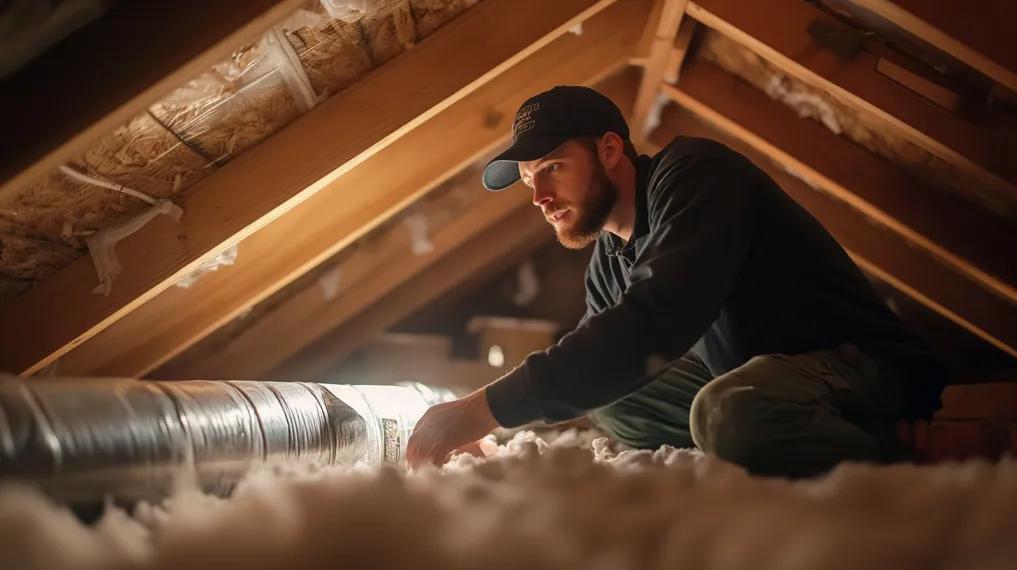A Comprehensive Guide to Insulating Ductwork

Air ducts are often hidden behind walls, in crawl spaces, or attics, making them easy to forget and access. However, it’s important to keep air ducts top of mind as they play a vital role in distributing conditioned air from your HVAC system to keep your living spaces comfortable and energy efficient.
If your ducts are poorly sealed or lack insulation, you could lose 20-30% of the conditioned air, leading to higher energy bills and reduced comfort. HVAC.com discusses whether insulating ductwork is a good idea, the benefits of doing so, and the costs.
When Should You Consider Insulating Ducts?
1. Unconditioned Spaces
If your air ducts run through unconditioned areas – like attics, basements, or crawl spaces – insulating them can help maintain the temperature of the air traveling through them. In the summer, cool air inside uninsulated ducts can be warmed by the surrounding environment, while in winter, warm air in ductwork can lose heat. Insulating the ducts helps combat these temperature fluctuations that are common in unconditioned areas of your home.
2. Older Homes
If you live in an older home with aging ductwork, the ducts could be older and more prone to damage and leaks, causing conditioned air to escape. If this is the case, consider contacting an HVAC professional to inspect your duct system and make a recommendation regarding insulation or complete duct replacement.
3. High Energy Bills
If you’ve noticed a spike in your energy bills without a corresponding increase in usage, your air ducts could be to blame. Leaky or uninsulated ductwork can waste significant amounts of energy, which drives up utility costs.
4. Comfort Issues
Are some rooms in your home consistently colder or hotter than others? This discomfort could stem from uninsulated ducts failing to deliver conditioned air effectively. Insulating your ducts can help ensure a more even distribution of temperature throughout your home.
5. Climate
If you live in a cold or humid climate, it’s a good idea to consider insulating your ducts – especially in unconditioned spaces – to prevent condensation that can damage and corrode your ductwork.
The Benefits of Duct Insulation
1. Energy Efficiency
The biggest reason to consider insulating your ducts is the potential for energy savings. Properly insulated ducts can reduce heat loss or gain and prevent unconditioned air from escaping, allowing your HVAC system to run more efficiently. This can potentially help you save hundreds of dollars a year on your energy bills.
2. Improved Comfort
Insulating your ducts can also enhance your overall comfort by ensuring a more consistent temperature in every room. This is especially beneficial for larger homes with multiple levels.
3. Reduced Noise
Insulation can also help dampen noise from your HVAC system. If you find the sound of air rushing through your ducts irritating, insulation can provide a quieter home environment.
4. Extended Lifespan of Your HVAC System
By reducing the strain on your HVAC system – thanks to less energy loss – insulated ducts can contribute to a longer lifespan for your heating and cooling equipment. This means fewer HVAC repairs and replacements in the long run.
How Much Does It Cost to Insulate Ducts?
The cost of insulating your home’s ductwork can vary depending on factors such as your home’s size, the type of insulation you use (fiberglass, polyethylene, and mineral wood), labor costs in your area, and the location of your ductwork. It can be more costly to insulate ductwork in difficult-to-access areas such as in your crawl space. On average, expect to pay about $1,000 to $2,500, including materials and labor, for ductwork installation.
While the upfront costs might seem daunting at first, the long-term savings can be worth adding insulation. Many homeowners report energy savings of 10-30% after insulating their ducts, which can lead to a quick return on investment.
Professional vs. DIY Installation
Deciding whether to hire a professional or tackle duct insulation as a DIY project depends on several factors. If you have experience with home improvement projects and the necessary tools, you might consider doing it yourself to save on labor costs. However, insulation can be tricky, especially in hard-to-reach areas, and improper installation can lead to air leaks and reduced efficiency.
Professionals have the expertise and tools to ensure the insulation is installed correctly and can identify any underlying issues with the ductwork. Ultimately, if you’re unsure or the project seems overwhelming, hiring a professional can provide peace of mind.